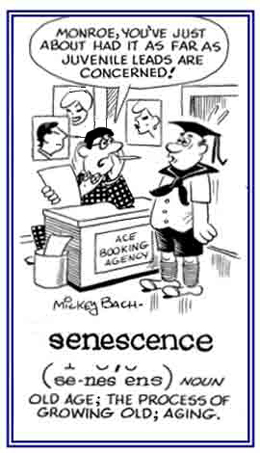sen-, sene-, seni-, sir-
(Latin: old age, old, elder, elderly)
"Since I intend to spend the rest of my life there, my interest is in tomorrow; and the best thing about tomorrow is that it comes one day at a time."
"Some aging people seem to have the attitude of Senectus insanabilis morbus est and choose not to try to do anything about it."
"A fatalist may conclude that Senectus ipsa morbus est and that there is nothing that he or she can do to change it."
Even though the trees in the forest had senesced they were in fact still healthy and green.

"Reading is to the mind what exercise is to the body."
In human life, senescence is equated with the period of functional-bodily decline that precedes death, with the appearance of age-related diseases.
2. The normal process or condition of aging, as distinguished from the effects of disease in advanced years: The gerontologist, Dr. McMahon, met with Mrs. Nelson to discuss the senescence that she was experiencing, now that she was well over 95 years old.3. Etymology: from Latin senescere, “to grow old” from senex, "old."

Go to this Word A Day Revisited Index
so you can see more of Mickey Bach's cartoons.
"People don't grow old. When they stop growing, they become old."
And middle age ends
The day your descendants
Outnumber your friends.
People are the only creatures on earth who can change their biology by what they think and feel
It would be impossible to isolate a single thought or feeling, a single belief or assumption, that doesn't have some effect on aging, either directly or indirectly.
Because the mind influences every cell in the body, human aging is fluid and changeable; it can speed up, slow down, stop for a time, and even reverse itself.
"Seven Ages of Man" or "All the World's a Stage"
And all the men and women merely players:
They have their exits and their entrances;
And one man in his time plays many parts,
His acts being seven ages. At first the infant,
Mewling (whimpering, sobbing) and puking in the nurse's arms.
And then the whining school-boy, with his satchel
And shining morning face, creeping like a snail
Unwillingly to school. And then the lover,
Sighing like furnace, with a woeful ballad
Made to his mistress' eyebrow. Then a soldier,
Full of strange oaths and bearded like the pard (leopard),
Jealous in honour, sudden and quick in quarrel,
Seeking the bubble reputation
Even in the cannon's mouth. And then the justice,
In fair round belly with good capon (tender chicken) lined,
With eyes severe and beard of formal cut,
Full of wise saws (proverbs) and modern instances (examples);
And so he plays his part. The sixth age shifts
Into the lean and slipper'd pantaloon (old fool),
With spectacles on nose and pouch on side,
His youthful hose, well saved, a world too wide
For his shrunk shank; and his big manly voice,
Turning again toward childish treble, pipes
And whistles in his sound. Last scene of all,
That ends this strange eventful history,
Is second childishness and mere oblivion,
Sans* teeth, sans eyes, sans taste, sans every thing.
(*without)
2. Belonging to, suited for, or an incident of the golden years: The retired chairman of the board, Mr. Fisk, walked with a senile gait because of his ripe and waning existence.
3. Forgetful, confused, or otherwise mentally less acute in later life: Like many other people, Mr.Evans had a senile moment when he walked into the room and forgot what he was looking for.
4. Occurring in or believed to be characteristic of being a senior; especially, during the period after the mid sixties: Because of his senile age, the law required the man to take a test drive before renewing his driver’s license.
Forgetting names and faces or misplacing keys are normal occurrences for any age and when people are young, they think nothing of such situations; however, as they get older, they're tempted to worry that such actions are signs of senility.
At school, there were two boys with the surname Smith; they were known as Smith, Senior and Smith, Junior.
2. A term for a very mature person; especially, someone who is past the age of retirement: Mrs. Thompson, the senior who lives in the same apartment building that Jane does, is very active and goes to the gym at least three times a week."
3. Someone ranking before others as a result of longer service or tenure in a position; that is, superior to others in standing or status: Greg's position at the bank was senior to all the other employees since he had worked at the bank for more than 40 years.
The senior class is the last year of an educational program; such as, high school or college: Mary's son, Ted, was a senior in his last year at high school and because of the expense, she was not sure whether he would be able to go on to a university after graduating.
Also visit this Quotes: Old Age section for other significant view points regarding old age.
Related "old; old age, elder" units: gero-; obsolesc-; presbyo-; veter-.


